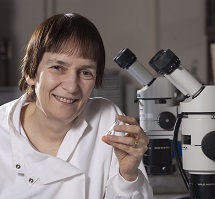Special edition: Botanicals
Better supply chain management will bring sustainability and quality, says botanical expert

As the demand for botanical ingredients rapidly grows so do the risks of adulteration and overharvesting, warned Simmonds - an expert from the Royal Botanical Gardens at Kew, UK.
"I think it is a big issue, especially as supplements and things like that are increasing in popularity," said the expert, who is director of the Kew innovation unit, deputy keeper and head of the sustainable uses of plants group at the Royal Botanical Gardens. "There is a real desire to provide quality materials, but the question is whether people will pay for that quality."
"If you take the narrow range of things that we do use - for medicinal uses, or in food supplements - I think the challenges are increasing, and that they will increase further."
Speaking with NutraIngredients as part of our special edition on botanicals Simmonds said that many companies that are supportive of quality are investing in better supply chain management - causing a shift from relying on third parties that are not connected with the parent company to a state where the main company are much more invested in the supply chain.
"I think you see more companies really having a greater concern that they do know exactly what is happening on their supply chain, and therefore linking closer with the source."

"And that's not just about ethical issues like labour or land use and fair costs, it's that they want to absolutely make sure that the product they are getting is what it says on the bottle - and not something that has been mixed."
From wild to cultivated
Simmonds added that that one of the main issue facing suppliers of 'smaller' botanical ingredients is getting the right supply chain as popularity grows - and moving from a wild harvested plan to one grown in plantations.
"If they suddenly become popular and there isn't a good agricultural practice in place to get them from wild harvest to cultivation then that can cause real problems because you end up with overharvesting," she explained - noting that not all botanicals will be able to take the step between wild harvested and cultivation, due to a number of factors involving environmental and planting conditions.
"A lot of research needs to be done in developing cultivation methods," Simmonds told us. "But also there is an amount of care that needs to be taken in making sure that the material selected for cultivation actually contains the profile of chemicals that are associated with its potential use."
"You might have the right species but you could end up with the wrong chemotype or variety, which leaves you with inferior material being grown that then ends up getting in to the trade and in the end has a negative effect."
"If you look at the diversity of plants, and then look at how few actually make it to market. Does that reflect that very few plants work?" she questioned. "I wouldn't have thought so. I would think that it's more about that we have not studies them enough or that we have not been able to make this transition from something that is wild harvested to something that is cultivated."
"We end up selecting the easily cultivated material."
Adulteration issues
Simmonds warned that increasing pressure on land use, due to population rises, housing, and climate change, have led to a huge increase in adulteration of botanical ingredients in recent times.
As a result, she said there is a clear need for further research in order to better understand and spot adulteration in addition to industry embracing different ways of identifying plants - from using traditional morphology to DNA barcoding.
"You will find that those companies that really do want to have quality will most likely support that, or whatever other alternative is used," she said.
She added that because mixing and adulteration can occur at various stages of the chain, there is likely to be a greater focus on managing every stage of that chain.
"I would not be surprised, if we looked at how plants got from the field to the final product ten years ago compared to maybe in five or six year's time - I think it's going to be very different," she said. "The number of people involved, I would not at all be surprised to see decrease."
Simmonds told us that one of the 'really fascinating' things about Kew is that she has access to such a wide array of collections which allows her and her colleagues to look back at the adulterants that were occurring 100 years ago.
"They were occurring, though not to the same level as now," she said. "The sophistication, and lengths that some will go to in order to get something through now is far more."
One of the examples, that the Kew team had recently was the adulteration of ginseng with codonopsis, which is another form of ginseng but doesn't have the same properties, said Simmonds.
In this case codonopsis plants that did not contain the same chemical compounds were sprayed with a solution of ginseng - meaning that when people did a test for these valuable compounds that are used as a quality control, they were found in the sample.
"They would have been in lower concentrations, but they were there, which would maybe lead somebody to think that the sample might not be of the best quality but was the real thing," she said. "Of course it wasn't it was totally different."
Quality comes at a price
"I think the need for authentication is definitely increasing," said Simmonds. "DNA barcoding is definitely, I think, a way for the future. We need to have something that does support and improve transparency."
However, the Kew director of innovation said that if the industry does want to have such quality controls, then they will come at a price.
"It would put a cost on, so if it's for the mass market, are they going to be able to bare that cost? ... It's a difficult challenge."
However, she did note that the cost of doing some types of authentication will decrease as the experts and industry gain a better knowledge of exactly what the issues are in order to come up with 'robust methods' for testing.
"We spent months and months initially when we had problems with star anise," she said. "We had an issue where Chinese star anise which is used in cooking was being replaced with adulterants like the Japanese star anise - which is toxic."
"Initially when we did that work, it took us quite a few months to get a robust method together for a test. But now we have that it's a little bit more routine."
However, the botanical expert noted that adulterants could vary widely depending on where the source material comes from and how it enters the supply chain.
"You might have the same product - like cinnamon - but the things it will be adulterated with will vary depending on whether that comes from for example Sri Lanka or India."
"Local substitutes will vary, so therefore having a knowledge about, what we term 'the lookalikes' and common substitutes is very important," she said.

















